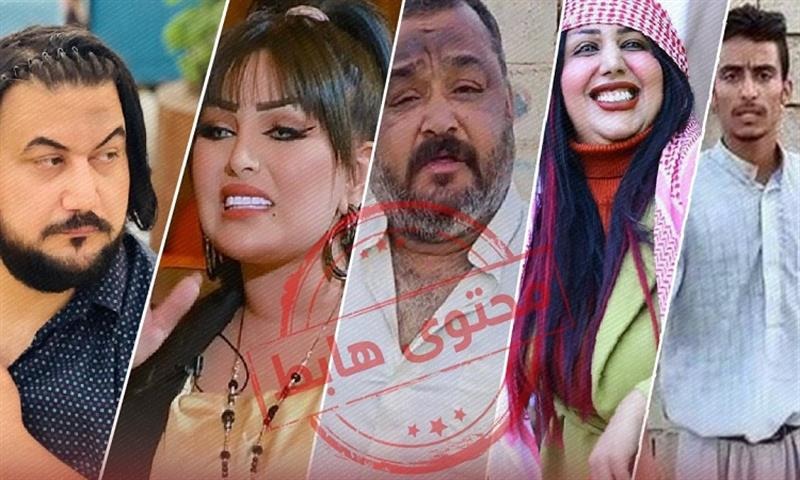
Shafaq News
Over the past two years, Iraqi courts and
security agencies have pursued dozens of cases against individuals accused of
blasphemy or producing “immoral content.”
In July 2024, a Mosul court sentenced a young
man to six months in prison for “insulting the divine self” in a video deemed
offensive to public taste. Months later, two men in Al-Anbar were arrested
during a live broadcast mocking religious sanctities, while a well-known singer
in Baghdad was detained for allegedly “defaming the divine” during a
performance.
At the same time, prosecutors turned their
attention to social media. TikTok influencers such as Ayah al-Shammari and
Zainab bint Diwaniyah were summoned for “immoral” videos, a Baghdad blogger was
charged after celebrating his wife’s pregnancy by blocking traffic, and Samaraa
TV was penalized for “immoral insinuations” in one of its programs.
Even in 2025, prosecutions continued against
influencers and public figures accused of insulting the divine or violating
public morals. These incidents form only part of a wider campaign that has
become a defining feature of Iraq’s legal and social landscape.
Divergent Reactions
The arrests drew mixed responses. Some Iraqis
welcomed them as overdue measures against “low content,” and others demanded
broader crackdowns on anyone seen as tarnishing Iraq’s reputation. Critics,
however, warned that such actions amount to an infringement on personal
freedoms, particularly when detainees had not, in their view, insulted Iraqis,
state institutions, or religious symbols.
Sheikh Mohammed al-Shammaa, Imam of the Nabi
Yunus Mosque in Mosul, told Shafaq News the campaign “represents a proper step
to confront producers of indecent content in the city.” He argued that some
social media figures “have become famous by spreading misleading and negative
impressions about Mosul to audiences in other Iraqi cities.”
Journalist Abdulrahman al-Taie described the
arrests as a “warning message” to social media users. He told Shafaq News that
combating low content “has become urgent given the decline in ethical behavior
and the shocks to social conduct.”
While calling for firm action, he noted that
authorities should first issue warnings and clarify legal boundaries to prevent
repeated violations on digital platforms.
Lawyer Ahmed al-Sinjari explained that
Article 403 of the Penal Code already addresses “immoral” publications that
corrupt public taste, but convictions require both a material act and criminal
intent. “If one of these elements is absent, courts must dismiss the case,” he
said, cautioning against exploiting moral laws to settle political scores. He
urged lawmakers to set clearer limits distinguishing genuine obscenity from legitimate
opinion or criticism.
Activists voiced stronger criticism. Social
media activist Ahmed Zidan told Shafaq News that the arrests serve as “a method
of repression and silencing.” He argued that most of those targeted “did not
threaten Iraq’s security or social stability,” while more dangerous
provocations—such as sectarian incitement, calls for violence, and attacks on
state institutions—are often overlooked when linked to powerful parties. “Some
influencers and politicians backed by dominant parties spread sectarian strife,
especially ahead of elections, to gain political advantage,” he said. “They are
more deserving of prosecution than young people chasing fame on social media.”
The Legal Dilemma
Iraq’s Penal Code provides the basis for
these prosecutions. Article 372 criminalizes insulting religion or divine
entities; Article 403 punishes the distribution of “immoral” materials; and
other provisions are sometimes stretched to cover online behavior. Yet none of
these articles clarifies where “criticism” ends and “insult” begins, or what
exactly counts as “immoral.”
This ambiguity leaves judges with wide
discretion. One court may treat satire as a crime, while another dismisses a
similar case. Even the Interior Ministry’s recent decision to rebrand its
monitoring body—from pursuing “low content” to pursuing “content violating
modesty and public morals”—did little to define terms or ease concerns about
arbitrary enforcement.
Why It Matters for Iraq
The controversy goes beyond individual acts,
whether mocking religion or posting provocative dances. It touches on how Iraq
defines the limits of expression in a society where religion, tribal codes, and
tradition remain powerful forces.
International indices consistently rank Iraq
among the most restrictive Middle Eastern states on freedom of expression.
Political elites often frame the protection of sanctities as a national duty,
blurring the line between defending faith and curbing dissent. Satire, critical
art, and social commentary risk being branded “immoral” under this narrative.
For activists and journalists, the climate
has fostered widespread self-censorship. The absence of clear legal standards
leaves citizens unsure of what is permissible, eroding trust in both the
judiciary and government.
The Contradiction
Iraq’s constitution guarantees freedom of
expression. In practice, however, religious sanctities, social traditions, and
tribal customs often override these rights. The contradiction between
constitutional promises and courtroom prosecutions highlights a deeper
structural question: is Iraq governed by codified law, or by shifting moral
codes enforced selectively?
Selective enforcement, particularly in an
election year, risks politicizing the judiciary. Prosecutions may serve to
silence critics while sparing politically connected figures who promote
sectarian narratives. For Iraq’s fragile democracy, the ambiguity is not merely
a legal gap—it is a test of whether the state can balance respect for tradition
with protection of fundamental freedoms.
Written and edited by Shafaq News staff.





